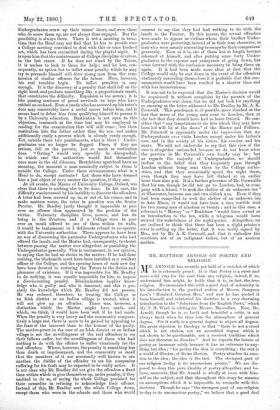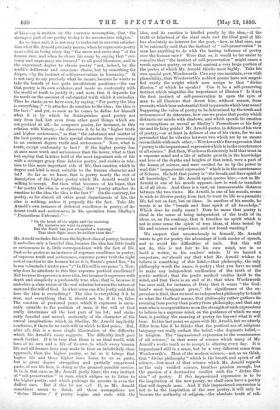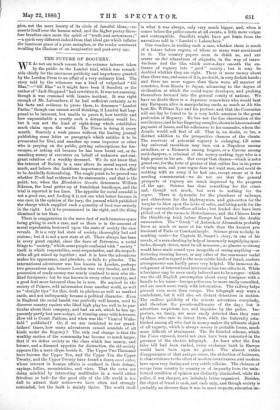MR. MATTHEW ARNOLD ON POETRY AND RELIGION.
R. ARNOLD has recently got hold of a crotchet of which ,
he is extremely proud. It is that Poetry is a surer and more solid stay for the soul than any religion ; indeed, if we understand him aright, he holds that it is, in fact, the true religion. He enunciated this with a good deal of solemnity in his introduction to the poetical section of Messrs. Sampson Low's "Hundred Greatest Men," and now he has quoted it from himself, and reinforced his doctrine in a very charming introduction to the "Selections from the English Poets," which Mr. T. H. Ward is editing for Messrs. Macmillan. Now, Mr. Arnold, though he is so lucid and beautiful a critic, is not always lucid when he rises into the atmosphere of general dogma. For it really is a general dogma to abjure all dogma. His great objection to theology is that "there is not a creed which is not shaken, not an accredited dogma which is not shown to be questionable, not a received tradition which does not threaten to dissolve." And he regards the future of poetry as immense solely because it has no reference to any- thing but idea ; "for poetry the idea is everything ; the rest is a world of illusion, of divine illusion. Poetry attaches its emo- tion to the idea; the idea is the fact. The strongest part of our religion to-day is its unconscious poetry." We are dis- posed to deny this pure ideality of poetry altogether, and be- lieve, moreover, that Mr. Arnold is wholly at issue with him- self on the subject, and that throughout this essay he reasons on assumptions which it is impossible to reconcile with' this doctrine. Though he says "the strongest part of our religion to-day is its unconscious poetry," we believe that a good deal
of his essay is written on the converse assumption, that 'the strongest part of our poetry to-day is its unconscious religion.'
As we have said, it is not easy to make out to our own satisfac- tion what Mr. Arnold precisely means, when he represents poetry as so solid, as being every day" the surer and surer stay" of the human race, and when he closes his essay by saying that "cur- rency and supremacy are insured" to all good literature, and in the supremest degree to classic poetry "not, indeed, by the world's deliberate and conscious choice, but by something far deeper,—by the instinct of sell-preservation in humanity:: It is not easy to say precisely what he means, because he wants to take the benefit of two quite inconsistent positions,—the one that poetry is its own evidence, and needs no conformity with the world of truth to justify it; and next, that it depends for its merit on the amount of substantial truth which it embodies.
Thus he starts, as we have seen, by saying, "For poetry the idea is everything ;" "it attaches its emotion to the idea; the idea is
the fact ;" and yet, so soon as he comes to define for himself what it is by which he distinguishes good poetry not only from bad, but even from other good things which are not poetical at all,—he compares poetry, for instance, in this relation with history,—he discovers it to be its "higher truth and higher seriousness," so that "the substance and niatter of the best poetry acquire their special character from possessing in an eminent degree truth and seriousness." Now, what is truth, except- conformity to fact? If the higher poetry has at once more truth and seriousness than the lower, what is that but saying that it takes hold of the most important side of life with a stronger grasp than inferior poetry, and excites in rela- tion to this more important side of life, that emotion which in degree and kind is most suitable to the human character and lot P So far as we know, that is pretty nearly the sort of description of the higher poetry which Mr. Arnold would be willing to accept. But then what becomes of his boast, that "for poetry the idea is everything," that "poetry attaches its emotion to the idea, the idea is the fact ?" On the contrary, for poetry, as for almost all other great departments of life, the idea is nothing, unless it properly fits the fact. Take Mr. Arnold's own instance of deficient excellence in poetry, of de- ficient truth and seriousness, in his quotation from Shelley's "Prometheus Unbound :"—
" On the brink of the night and the morning My coursers are wont to respire ;
But the Earth has just whispered a warning That their flight must be swifter than fire."
Mr. Arnold excludes this from the highest class of poetry, because it embodies only a fanciful idea, because the idea has little truth or seriousness in it, little correspondence with the fact of life. Just so he quotes as an instance of supreme excellence in poetry, of supreme truth and seriousness, supreme power to fit the right sort of emotion to the human lot as it is, Dante's grand line, "In la saa voluntade 6 nostre pace" ("In His will is our peace "). Now, why does he attribute to this line supreme poetical excellence ? Not because it expresses a mere idea, but because it expresses with depth and simplicity a profoundly true idea; that is, because it embodies a clear vision of the real relation between the nature of man and the will of God. In what sense can it be justly said that here the idea is everything? The idea is everything if it be true, and everything that it should not be, if it be false. The emotion of profound peace which it expresses is emin- ently suitable to the position of man, if the will of God really determines all the best part of his lot; and emin- ently fanciful and unreal, eminently of the character of the unreal imaginations which, in Shelley, Mr. Arnold implicitly condemns, if there be no such will in which to find peace. Bat, after all, this is a mere single illustration of the difficulty
which Mr. Arnold's essay suggests. The difficulty itself goes much further. If it be true that there is an ideal world, with laws of its own and a life of its own, to which every human life and all human laws may make in time an indefinitely close 'approach, then the higher poetry, so far as it brings that higher life and those higher laws home to us as parts, but in great degree struggling and partially suppressed parts, of our life here, is doing us the greatest possible service.
It is, in that case, as Mr: Arnold justly hints,. the very instinct of " self-preservation " in man, which obliges us to listen to the higher poetry, and which prolongs its accents in even the
dullest ears. But if this be not so'? If, as Mr. Arnold sometimes seemb to think, all these assumptions are "divine illusion ;" if poetry . begins and ends with the
idea, and its emotion is kindled purely by the idea,—if the troth or falsehood of the ideal ends and the ideal goal of life. has absolutely no interest for the poet,—how, in that case, can it be rationally said that the instinct of " self-preservation " in man has anything to do with the lasting influence of poetry over the human race P Were that so, it would be far easier to conceive that "the instinct of self-preservation" might cause a revolt against poetry, or at least against a very large portion of the poetry of which Mr. Arnold thinks most highly. Take his own special poet, Wordsworth. Can any one maintain, even with plausibility, that Wordsworth's noblest poems have not magni- fied vastly the weight which. men assign to that "divine illusion." of which he speaks? Can it be a sell-preserving instinct which niagnifies the importance of illusion ? Is it not the first instinct of self-preservation to open the eyes of man to all illusions that divert him, without reason, from pursuits which bear substantial fruit to pursuits which bear none? Supposing the value of poetry to be determined by the truth and seriousness of its utterance, how can we praise that poetry which distracts our minds with shadows, and which spends its emotion on conceptions as unreal as Shelley's Prometheus or his fiery car and its fairy guide ? Mr. Arnold quotes, in defence of his view of poetry,—or at least in defence of one of his views, for we are persuaded that he vibrates between two which are by no means reconcilable with each other,—Wordsworth's fine expression that "poetry is the impassioned expression which is lathe countenance of all science." But then, Wordsworth sincerely held that trust in a supreme mind and a life of infinite growth in the knowledge and love of the depths and heights of that mind, were a part of the lesson of science, and were verified for us b.y the power to read thin" impassioned expression" which is in the countenance of Science. He held that poetry is "the breath and finer spirit of all knowledge," as Mr. Arnold again quotes him ;—not as Mr .Arnold in one of his moods appears now to wish to translate it, of all ideas. And there is a vast, an immeasurable distance between the two views. Mr. Arnold, in one of his moods, seems to wish to divorce poetry from fact, to treat its life as a parasitic life, fed not on fact, but on ideas. In another of his moods, he treats it as the "breath and finer spirit of all knowledge." Which does he really mean? Does he mean that poetry is ideal in the sense of being independent of the truth of its ideas, or, on the contrary, that it breathes no spirit which is not in some sense the spirit of true ideas, of ideas tested by life and science and experience, and not found wanting?
We suspect that unconsciously to himself, Mr. Arnold wants to get for poetry the advantage of both modes of speech,
and to avoid the difficulties of each. But this will not do, this is not fair to his own mind, nor in so lucid a writer, to his readers' minds. If we hazard a conjecture, we should say that what Mr. Arnold wishes to believe is something of this kind,—that philosophy, the only philosophy worth the name, is poetry ; that you have no need to make any independent verification of the truth of the poetic method ; that the poetic method verifies itself to the mind, and that there is an end of it; that when Wordsworth has once said, for instance, of Duty that it wears "the God- head's most benignant grace," the significance of the -ex- pression is final, that we need no independent philosophy-to teach us what the Godhead means, -that philosophy rather gathers its meaning from poetry than poetry from philosophy, and that any man who is so superstitious as on the strength of such expressions to believe in a supreme mind, on the guidance of which we may lean, is pushing the meaning of poetry far beyond what it will bear. In this last point we agree with Mr. Arnold, but we utterly differ from him if he thinks that the poetical use of religious language can really outlast the belief—the dogmatic belief,— in religion. The "impassioned expression in the countenance of all science," in that sense of science which many of Mr. Arnold's works testi' us to accept, is altering every day. It is impassioned still in a sense, but -in a very different sense from Wordsworth's. Most of the modern science,—not, as we think, that "divine philosophy" which is the breath and spirit of all science,—bat most of that science which Mr. Arnold regards as the only verified science, breathes passionenough, but the passion of a destructive conflict with the passion- illu- sion" of poetry. If this impassioned expression is to be the inspiration of the hew poetry, we shall soon have a poetry that will degrade man. And if this impassioned expression is not to be the inspiration of the new poetry, it will only be because the authority of religion,—the absolute truth of reli.
gion, not the mere beauty of its circle of fanciful ideas,—re- asserts itself over the human mind, and the higher poetry there- fore breathes once more the spirit of "truth and seriousness ;" —a spirit very different indeed from that ideal gas which inflates the luminous grace of a pare metaphor, or the tender sentiment recalling the illusions of an imaginative and past-away age.




































 Previous page
Previous page